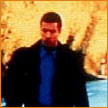
|
A Godardian elegy
Eloge de l’Amour makes no attempt to disguise its mournful lament for the long-dead past
|
Jeet Thayil
Jean-Luc Godard's Eloge de l'Amour (In Praise of Love) misses the resonant quality of the original French. Eloge could more accurately be translated as 'eulogy' or even 'elegy', both of which convey the sense of melancholy Godard meant to evoke.
Eloge de l'Amour is indeed an elegy, a mournful poetic lament for an idealised and long-dead past. This is a prevailing Godardian theme. The past is most often seen as beautiful, irretrievable, its passing as an occasion for guarded reverie. In this case Godard is mourning the past as a location for love. He evokes love replete in cross-generational grandeur through the stories of three couples of different ages.
The story, such as it is, involves a young filmmmaker and writer named Edgar (Bruno Putzulu), an ambivalent Godardian figure. Edgar, who is constantly consulting a book of blank pages, wants to concoct a tribute to love in its four supposed stages: the meeting, the passion, the separation, the reconciliation. While casting the movie he meets an enigmatic young woman (Cecite Camp), who rebuffs him.
The movie then slips to a period two years earlier. Edgar sets forth to meet an elderly couple who fought for the French resistance and are now in the process of selling their story to Hollywood. Godard, ever the iconoclast and originator, reverses cinematic convention. The first half of the film, set in the present, is shot in black and white. The second half, set in the past, is shot in glorious saturated colour.
There is the standard anti-Americanism Godard has always been partial to, as are all men of 'un certain age' and uncertain disposition. But the jabs at America are more playful than vicious. And especially when he takes on Spielberg, a long-standing target, he seems doddering and cantankerous more than genuinely confrontational.
Never mind the plot and the knee-jerk French radicalism, this movie has other more central pleasures.
The actors are dispensable, as they often seem to be in later Godard. They merely exist as a component in the director's toolkit. There are very few close-ups. When they occur more often than not it is of a woman. Putzulu as Edgar could be any male figure of comparable height and weight. For that reason, and others, this is a director’s movie, and Godard is a director’s director. So what else is new?
Well for one thing, the seductive cinematography. If there is an urban poet of French cinema it is Godard, nobody else. The first half of this 98-minute movie is set on the night-time streets of Paris --- lovely black-and-white images that make you long for the city even if you have never been there. They make you long to walk its boulevards, to drive a car, to sit on a bench and stare at its brightest lights.
Another of the potent pleasures of Eloge de l'Amour is the score. Godard has an instinct for sound that allows him to do more with a few seconds of piano and strings than other filmmakers achieve with an entire orchestra over an entire movie. The score begins and ends at seemingly random moments that are as much a part of Godard's rhythmic editing techniques as are his montages and overlaps.
Godard has made 42 movies as director, 25 as screenplay writer, five as editor. This is the first film he has made in almost 30 years set on the streets of Paris. It is his first film in four years and his first in a long time that makes no effort to disguise an elegiac, almost sentimental, air. There are worse things to do than wait for the next Godard.
Eloge de l'Amour ends with an achingly unresolved scene --- Edgar seen from the back walking, as a Beckettian voiceover rasps 'nothing was said'. The image stops and starts repeatedly but it is the director's epitaph for himself.